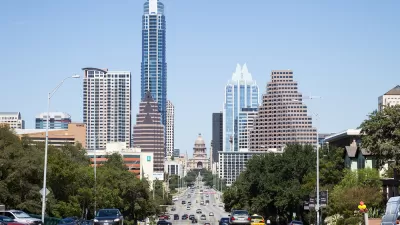The Texas capital’s new parking law signals a shift in thinking about the relationship between land use, transportation, and housing affordability.

Parking reform’s steady march may have reached a tipping point as Austin became the latest city—and one of the largest—to remove parking requirements citywide. As Kea Wilson writes in Streetsblog, the decision acknowledges parking’s role in perpetuating sprawl and driving up housing costs and is part of the city’s effort to stimulate enough housing production to accommodate its rapidly growing population.
Wilson notes that “Eliminating parking minimums alone, of course, won’t erase car dependency in Austin — and it may not dramatically slow the pace at which developers are building car storage.” But promoting denser development with less parking and more access to transit could increase affordability and help the city reach its goal to get half of the population commuting by transit or other non-car modes within the next two decades.
Read more about this hot topic at the parking reform tag.
FULL STORY: Every Growing City Should Heed Austin’s New Parking Law

Planetizen Federal Action Tracker
A weekly monitor of how Trump’s orders and actions are impacting planners and planning in America.

Maui's Vacation Rental Debate Turns Ugly
Verbal attacks, misinformation campaigns and fistfights plague a high-stakes debate to convert thousands of vacation rentals into long-term housing.

Restaurant Patios Were a Pandemic Win — Why Were They so Hard to Keep?
Social distancing requirements and changes in travel patterns prompted cities to pilot new uses for street and sidewalk space. Then it got complicated.

In California Battle of Housing vs. Environment, Housing Just Won
A new state law significantly limits the power of CEQA, an environmental review law that served as a powerful tool for blocking new development.

Boulder Eliminates Parking Minimums Citywide
Officials estimate the cost of building a single underground parking space at up to $100,000.

Orange County, Florida Adopts Largest US “Sprawl Repair” Code
The ‘Orange Code’ seeks to rectify decades of sprawl-inducing, car-oriented development.
Urban Design for Planners 1: Software Tools
This six-course series explores essential urban design concepts using open source software and equips planners with the tools they need to participate fully in the urban design process.
Planning for Universal Design
Learn the tools for implementing Universal Design in planning regulations.
Heyer Gruel & Associates PA
JM Goldson LLC
Custer County Colorado
City of Camden Redevelopment Agency
City of Astoria
Transportation Research & Education Center (TREC) at Portland State University
Jefferson Parish Government
Camden Redevelopment Agency
City of Claremont





























